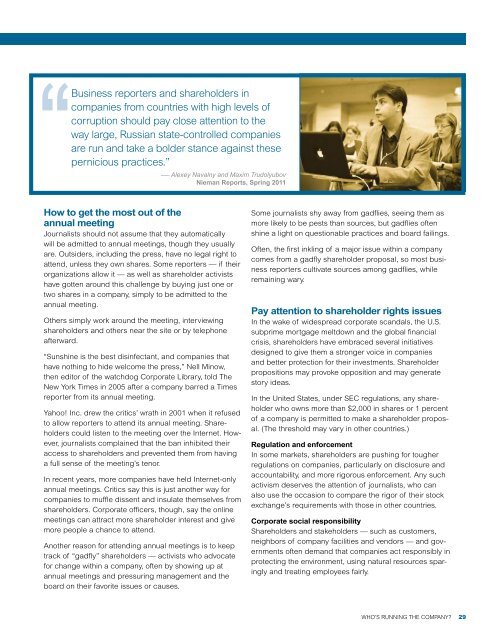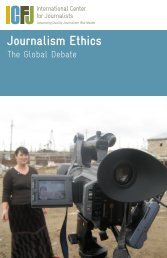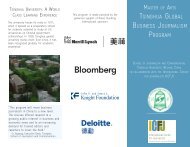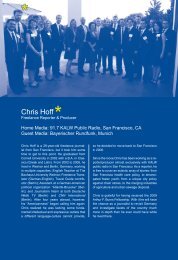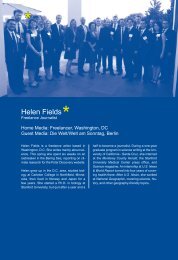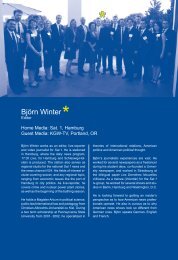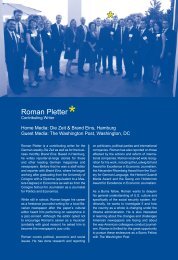Who's Running the Company? - International Center for Journalists
Who's Running the Company? - International Center for Journalists
Who's Running the Company? - International Center for Journalists
You also want an ePaper? Increase the reach of your titles
YUMPU automatically turns print PDFs into web optimized ePapers that Google loves.
‘‘<br />
Business reporters and shareholders in<br />
companies from countries with high levels of<br />
corruption should pay close attention to <strong>the</strong><br />
way large, Russian state-controlled companies<br />
are run and take a bolder stance against <strong>the</strong>se<br />
pernicious practices.”<br />
-— Alexey Navalny and Maxim Trudolyubov<br />
Nieman Reports, Spring 2011<br />
How to get <strong>the</strong> most out of <strong>the</strong><br />
annual meeting<br />
<strong>Journalists</strong> should not assume that <strong>the</strong>y automatically<br />
will be admitted to annual meetings, though <strong>the</strong>y usually<br />
are. Outsiders, including <strong>the</strong> press, have no legal right to<br />
attend, unless <strong>the</strong>y own shares. Some reporters — if <strong>the</strong>ir<br />
organizations allow it — as well as shareholder activists<br />
have gotten around this challenge by buying just one or<br />
two shares in a company, simply to be admitted to <strong>the</strong><br />
annual meeting.<br />
O<strong>the</strong>rs simply work around <strong>the</strong> meeting, interviewing<br />
shareholders and o<strong>the</strong>rs near <strong>the</strong> site or by telephone<br />
afterward.<br />
“Sunshine is <strong>the</strong> best disinfectant, and companies that<br />
have nothing to hide welcome <strong>the</strong> press,” Nell Minow,<br />
<strong>the</strong>n editor of <strong>the</strong> watchdog Corporate Library, told The<br />
New York Times in 2005 after a company barred a Times<br />
reporter from its annual meeting.<br />
Yahoo! Inc. drew <strong>the</strong> critics’ wrath in 2001 when it refused<br />
to allow reporters to attend its annual meeting. Shareholders<br />
could listen to <strong>the</strong> meeting over <strong>the</strong> Internet. However,<br />
journalists complained that <strong>the</strong> ban inhibited <strong>the</strong>ir<br />
access to shareholders and prevented <strong>the</strong>m from having<br />
a full sense of <strong>the</strong> meeting’s tenor.<br />
In recent years, more companies have held Internet-only<br />
annual meetings. Critics say this is just ano<strong>the</strong>r way <strong>for</strong><br />
companies to muffle dissent and insulate <strong>the</strong>mselves from<br />
shareholders. Corporate officers, though, say <strong>the</strong> online<br />
meetings can attract more shareholder interest and give<br />
more people a chance to attend.<br />
Ano<strong>the</strong>r reason <strong>for</strong> attending annual meetings is to keep<br />
track of “gadfly” shareholders — activists who advocate<br />
<strong>for</strong> change within a company, often by showing up at<br />
annual meetings and pressuring management and <strong>the</strong><br />
board on <strong>the</strong>ir favorite issues or causes.<br />
Some journalists shy away from gadflies, seeing <strong>the</strong>m as<br />
more likely to be pests than sources, but gadflies often<br />
shine a light on questionable practices and board failings.<br />
Often, <strong>the</strong> first inkling of a major issue within a company<br />
comes from a gadfly shareholder proposal, so most business<br />
reporters cultivate sources among gadflies, while<br />
remaining wary.<br />
Pay attention to shareholder rights issues<br />
In <strong>the</strong> wake of widespread corporate scandals, <strong>the</strong> U.S.<br />
subprime mortgage meltdown and <strong>the</strong> global financial<br />
crisis, shareholders have embraced several initiatives<br />
designed to give <strong>the</strong>m a stronger voice in companies<br />
and better protection <strong>for</strong> <strong>the</strong>ir investments. Shareholder<br />
propositions may provoke opposition and may generate<br />
story ideas.<br />
In <strong>the</strong> United States, under SEC regulations, any shareholder<br />
who owns more than $2,000 in shares or 1 percent<br />
of a company is permitted to make a shareholder proposal.<br />
(The threshold may vary in o<strong>the</strong>r countries.)<br />
Regulation and en<strong>for</strong>cement<br />
In some markets, shareholders are pushing <strong>for</strong> tougher<br />
regulations on companies, particularly on disclosure and<br />
accountability, and more rigorous en<strong>for</strong>cement. Any such<br />
activism deserves <strong>the</strong> attention of journalists, who can<br />
also use <strong>the</strong> occasion to compare <strong>the</strong> rigor of <strong>the</strong>ir stock<br />
exchange’s requirements with those in o<strong>the</strong>r countries.<br />
Corporate social responsibility<br />
Shareholders and stakeholders — such as customers,<br />
neighbors of company facilities and vendors — and governments<br />
often demand that companies act responsibly in<br />
protecting <strong>the</strong> environment, using natural resources sparingly<br />
and treating employees fairly.<br />
WHO’S RUNNING THE COMPANY?<br />
29


